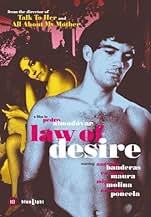A gay filmmaker becomes involved with an obsessive fan while still pining for his absent true love. Meanwhile, he shares a close but complex relationship with his trans sister, an actress.A gay filmmaker becomes involved with an obsessive fan while still pining for his absent true love. Meanwhile, he shares a close but complex relationship with his trans sister, an actress.A gay filmmaker becomes involved with an obsessive fan while still pining for his absent true love. Meanwhile, he shares a close but complex relationship with his trans sister, an actress.
- Awards
- 10 wins & 3 nominations total
Fernando Guillén
- Inspector de policía
- (as Fernando Guillen)
Nacho Martínez
- Doctor Martín
- (as Nacho Martinez)
Bibiana Fernández
- Ada - madre
- (as Bibi Andersen)
Rossy de Palma
- Locutora tele.
- (as Rosy Von Donna)
- Director
- Writer
- All cast & crew
- Production, box office & more at IMDbPro
Featured reviews
This is my second favourite Almodovar film, after "Hable con Ella". It reveals the depth of the characters' feelings with such subtlety and delicacy that as viewers we find ourselves unable to judge the characters' actions. We are puzzled by the intensity of their desire, love and misery in the same way that we are puzzled by Benigno's deep loneliness and longing for love in "Hable con Ella". In "La ley del Deseo," murder and suicide become extreme natural consequences of the characters' love and suffering. We cannot condemn the murder any more than we can condemn the rape in "Hable con Ella".
You will find all the familiar Almodovar devices here: telephones, drug use (cocaine in particular), dysfunctional families, sexual ambiguity, pedophile priests, and hospitals. These themes permeate his work, but they are woven intricately throughout this film.
Pablo (Eusebio Poncela) is a writer/director of fantastic movies. He gets into the snares of an obsessive (Antonio Banderas in a great performance) who has a fatal attraction and will kill for his love. At the same time, he has to deal with his transvestite sister played by Carmen Maura (Volver, Women on the Verge, Matador) in another magnificent role.
It is a melodrama about love as that is the overriding need for Banderas and for Maura, who has given up on men since her father left her. It is also about family. Of course, there is a crossing of genres as there is some comedy, but that is minor.
Another magnificent Almodovar film.
Pablo (Eusebio Poncela) is a writer/director of fantastic movies. He gets into the snares of an obsessive (Antonio Banderas in a great performance) who has a fatal attraction and will kill for his love. At the same time, he has to deal with his transvestite sister played by Carmen Maura (Volver, Women on the Verge, Matador) in another magnificent role.
It is a melodrama about love as that is the overriding need for Banderas and for Maura, who has given up on men since her father left her. It is also about family. Of course, there is a crossing of genres as there is some comedy, but that is minor.
Another magnificent Almodovar film.
The most significant aspect of The Law of Desire is the fact that it was so accepted in Spain at the time of its release. It was put forward by the authorities as the movie to represent the country in 1987. Bearing in mind that Spain had only come out of a fascist dictatorship not much more than a decade earlier, this simple fact is a testament to how far the country had moved on in such a short period of time. The reason for this is that this is an unashamedly gay themed film, one that celebrates homosexuality and depicts it without issue.
The film itself is about a love triangle between three men. Like several other Pedro Almodóvar films it's a melodrama with thriller elements. It features an extremely daring performance by Antonio Banderas in a role where he is required to perform in some full-on gay love scenes. These moments made the film front page news in Spain but it did nothing to stop Banderas subsequent rise to stardom. For me, however, this is a middling movie. It's not amongst the director's best. In my view, its interest lies more in its historical significance as opposed to it's worth as a film.
The film itself is about a love triangle between three men. Like several other Pedro Almodóvar films it's a melodrama with thriller elements. It features an extremely daring performance by Antonio Banderas in a role where he is required to perform in some full-on gay love scenes. These moments made the film front page news in Spain but it did nothing to stop Banderas subsequent rise to stardom. For me, however, this is a middling movie. It's not amongst the director's best. In my view, its interest lies more in its historical significance as opposed to it's worth as a film.
10gonz30
THE LAW OF DESIRE opened the 1987 Miami Int'l Film Festival. Almodovar and Carmen Maura had already broken through to the American market at this event with WHAT HAVE I DONE TO... a few years earlier. So it was surprising to find them pacing nervously up and down the lobby of the C.Grove Playhouse at THE LAW's North American premiere. They were also in and out of its rest rooms, as the sold out audience roared in laughter and applauded the film, and I was making an early dash to the post-premiere party at the Viscaya Palace. They were acting just like the neurotic characters they bring to life in this and their other films. They were still insecure and frustrated that their huge popularity and celebrity status in Europe was reduced to a recent, almost cult, following in the U.S. They needn't have worried. The film confirmed both of these artists along with Antonio Banderas as stars among North American art movie lovers. (This achievement would be crowned the following year with the triumph of their next collaboration: the Oscar-nominated WOMEN ON THE VERGE...) But THE LAW OF DESIRE will be remembered as Almodovar's self-confessed most personal work, and the masterpiece of his earlier career. This film is pure Almodovar, before he toned down to more mainstream fare. LAW... resumes the Almodovarian style, in all its excesses. It features most of his muses, beyond Maura and Banderas: Rossy dePalma, Bibi Anderssen, Eusebio Poncela, and the rest. His style as a writer/director of women goes over the top here, as does his predilection with telephones, the police, drug use (cocaine in particular), the media, dysfunctional families, sexual ambiguity, the Catholic Church, and the city of Madrid. Almodovar fans will note that all the above themes permeate his work. But nowhere are they so well linked and exposed as in this landmark film.
I saw this film after having seen Bad Education, and there are many plot lines similar in both. I loved this film, not only am I a huge fan of Almodóvar, but in this film, the easy and simple beauty of the shots stood out. The acting was good, not amazing but good, particularly from Pablo and Tina. As well as directing beautifully, Almodóvar knows how to infuse a scene with sex, even if no sex is actually taking place-for example, when Antonio lights his cigarette of Pablo's. The film does become melodramatic towards the end, but I don't see this as a failing, melodrama, if done well, as it is here, need not be ridiculous
Did you know
- TriviaPedro Almodóvar considers Antonio Banderas's performance in this film his strongest to date.
- Quotes
Pablo Quintero: It's not your fault if you don't love me and its not my fault if I love you.
- Crazy creditsPedro Almodóvar appears in a scene as an employee in a DIY shop and serves Banderas's character.
- ConnectionsFeatured in Schau mir in die Augen, Kleiner (2007)
- SoundtracksSymphony No. 10 in E minor, Op. 93
Composed by Dmitri Shostakovich (as D. Shostakovich)
Performed by Orquesta Sinfonica de la Flarmonicade Mosou
Conducted by Kirill Kondrashin (as Kirill Kondrachine)
- How long is Law of Desire?Powered by Alexa
Details
Box office
- Gross US & Canada
- $72,442
- Opening weekend US & Canada
- $13,399
- Aug 13, 2006
- Gross worldwide
- $101,773
- Runtime
- 1h 42m(102 min)
- Sound mix
- Aspect ratio
- 1.66 : 1
Contribute to this page
Suggest an edit or add missing content










































